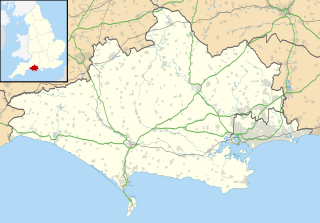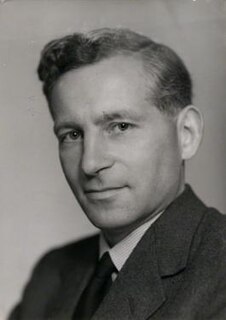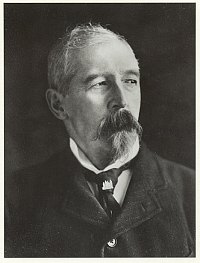
The Dean Cemetery is a historically important Victorian cemetery north of the Dean Village, west of Edinburgh city centre, in Scotland. It lies between Queensferry Road and the Water of Leith, bounded on its east side by Dean Path and on its west by the Dean Gallery. A 20th-century extension lies detached from the main cemetery to the north of Ravelston Terrace. The main cemetery is accessible through the main gate on its east side, through a "grace and favour" access door from the grounds of Dean Gallery and from Ravelston Terrace. The modern extension is only accessible at the junction of Dean Path and Queensferry Road.

Edward Strutt, 1st Baron Belper PC FRS, was a British Liberal Party politician. He served as Chancellor of the Duchy of Lancaster from 1852 to 1854 under Lord Aberdeen.

Sherborne School is an English independent boarding school for boys, located in the parish of Sherborne Abbey, located in the town of Sherborne in Dorset. The school has remained in the same location for over 1,300 years. It was founded in 705 AD by Aldhelm and, following the dissolution of the monasteries, re-founded in 1550 by King Edward VI, making it one of the oldest schools in the United Kingdom. Sherborne was one of the founder member public schools of the Headmasters' and Headmistresses' Conference in 1869, and is a member of the Eton Group.

The Belfast Royal Adacemy is the oldest school in the city of Belfast, Northern Ireland. It is a co-educational, non-denominational voluntary grammar school situated in north Belfast. The Academy is one of 8 schools in Northern Ireland whose Head is a member of the Headmasters' and Headmistresses' Conference
The Regius Professorships of Divinity are amongst the oldest professorships at the University of Oxford and the University of Cambridge. A third chair existed for a period at Trinity College, Dublin.

William Owen Chadwick was a British Anglican priest, academic, rugby international, writer and prominent historian of Christianity. As a leading academic, Chadwick became Dixie Professor of Ecclesiastical History from 1958 to 1968 and Regius Professor of History from 1968 to 1983. From 1956 to 1983, Chadwick was elected and served as the Master of Selwyn College, Cambridge.
Sir Frederick Maurice Powicke was an English medieval historian. He was a Fellow of Merton College, Oxford, a professor at Belfast and Manchester, and from 1928 until his retirement Regius Professor at Oxford. He was made a Knight Bachelor in 1946.
The Regius Professor of History at the University of Oxford is a long-established professorial position. Holders of the title have often been medieval historians. The first appointment was made in 1724. The term "Regius" reflects the origins of the post as a royal appointment, itself a recognition of the important influence of history.
The White's Chair of Moral Philosophy was endowed in 1621 by Thomas White, DD, Canon of Christ Church at the University of Oxford.
Encyclopaedia Biblica: A Critical Dictionary of the Literary, Political and Religion History, the Archeology, Geography and Natural History of the Bible (1899), edited by Thomas Kelly Cheyne and J. Sutherland Black, is a critical encyclopedia of the Bible. In theology and biblical studies, it is often referenced as Enc. Bib., or as Cheyne and Black.

The Cambrian Archaeological Association was founded in 1846 to examine, preserve and illustrate the ancient monuments and remains of the history, language, manners, customs, arts and industries of Wales and the Welsh Marches and to educate the public in such matters. The association's activities include sponsoring lectures, field visits, and study tours; as well as publishing its journal, Archaeologia Cambrensis, and monographs. It also provides grants to support research and publications.
The 1902 Coronation Honours were announced on 26 June 1902, the date originally set for the coronation of King Edward VII. The coronation was postponed because the King had been taken ill two days before, but he ordered that the honours list should be published on that day anyway.
The New Year Honours 1926 were appointments by King George V to various orders and honours to reward and highlight good works by members of the British Empire. They were published on 29 December 1925.
The Royal Households of the United Kingdom consists of royal officials and the supporting staff of the British Royal Family, as well as the Royal Household which supports the Sovereign. Each member of the Royal Family who undertakes public duties has their own separate household. When Elizabeth II succeeded her father George VI as sovereign of the United Kingdom, she appointed a new household.
Unless stated otherwise, the names are from the list of fellows, alive and dead, in Proceedings of the British Academy, vol. xviii (1932), pp. vii–x.











